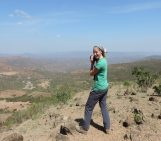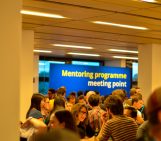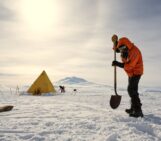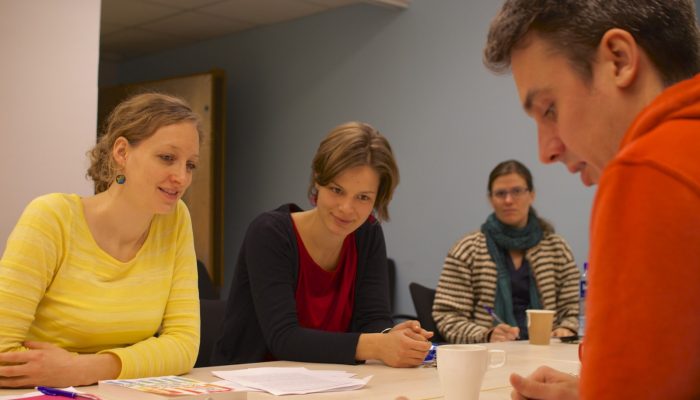
Writing is something that those pursuing a career in academia are expected to be good at. It is a requirement of the job, yet it is a skill few get any formal training in and simply rely on the old saying that practice makes perfect. But what if there is another way? Mathew Stiller-Reeve is a co-founder of ClimateSnack, a writing group organization, which aims to tackle the problem. In today’s post Mathew considers how the workings of a football team might reflect the successes of the writing groups that started in the ClimateSnack project.
The premise behind the ClimateSnack project is simple: We need to improve our writing in science. But many young researchers do not have access to good training initiatives, especially not continuous ones. So, maybe we should just mobilize ourselves; we can mobilize ourselves by starting writing groups and working together to improve. In ClimateSnack, early career scientists (ECS) start writing groups at their home institute. Participants write short popular science articles (usually 400-500 words), read them aloud, get feedback, and publish online. Several ClimateSnack writing groups sprouted up all over the world, however, only a few truly blossomed. What made some groups work and some not? We analyzed the answer to this question in our new paper. The style of a peer-review paper didn’t allow us to make fancy, lengthy analogies. But on GeoLog, I feel safe using football as an analogy to explain the workings of a writing group, and maybe infuse some of my own personal opinions too.
Football is a team sport, but you can play football completely alone and still become an expert. You can see this when you watch football freestylers (like Indi Cowie in the video) do their incredible tricks. Most of these tricksters likely play football with a whole team, but they don’t have to. The same applies to science writing and communication. You can become an expert in these skills by yourself, and some people prefer this. But for ECS’s who like to work together, ClimateSnack would give them the opportunity to improve as part of a team: a writing group.
But what was needed for the teams to work successfully? And what did we learn from the teams that disbanded after a few training sessions?
Successful football teams have good leadership, and in particular good captains. Good captains bring out the best in their players, encourage them when things get hard and manage conflict. These elements were reflected in the ClimateSnack writing groups. The strong leaders guided the groups and encouraged participants to contribute in sensitive ways. However, strong leaders don’t stick around forever. Just as other football clubs often buy captains, writing group leaders also moved on; they finished PhDs and got jobs far, far away. New captains needed to be found, but this was always a challenge.

Can the workings of a football team reflect the successes of the writing groups that started in the ClimateSnack project? Credit: Syaza , distributed via gify.
I am absolutely not saying that the leaders of the disbanded other groups were poor captains! Even a potentially good captain cannot lead a team if he/she doesn’t know the rules of the game. If the rules are not clear then the whole team cannot play properly together. They need to know where the goal is; they need to understand the game’s objectives. And this is where the ClimateSnack management team (where I am most to blame!) was shortsighted. We failed to properly communicate the objectives and aims of a ClimateSnack writing group and the writing process we suggested.
Even if a football team knows the rules and has a good captain, they won’t get far if morale is low, or if the players haven’t got time to train or turn up for matches. We noticed that a lot of the motivation within writing groups was linked to socializing. Just as some amateur football teams might go to the pub after training, one successful writing group planned their meetings just before the Department coffee break so everyone could socialize after the hard work was done.
What other elements need to be in place for a football team to work?
The right number of players is an absolute necessity. Most people have seen how a football team struggles after a couple of players have been sent off. You may have also heard about players going to other clubs if they don’t get to play enough matches. The ClimateSnack group meetings also faced challenges with the number of participants. One group had so many participants to start with that it became difficult to manage. It is difficult for everyone to get something out of a peer feedback discussion if too many are involved. In this instance, participants lost interest and numbers decreased steadily and finally to a level where too few attended and the group disbanded. In our Bergen group, we always find that the best discussions happen with 4-6 people at the meetings. If we get far more than this in the future, then we will likely split into smaller discussion groups which work more effectively.
Effective writing groups demand some kind of time commitment from the participants. Good writing requires practice, just like football. Football players often train several times a week. With ClimateSnack, we did not have the luxury of asking the members for this level of commitment. Students are already under pressure from a variety of different sources. They need to complete mandatory courses, collect data, attend conferences, and work as teaching assistants. People who play football have a passion for the game and make time for it. Unfortunately, few young researchers have a passion for writing (cards on the table: I was exactly the same. It took a lot of time before I started enjoying writing). Therefore, something voluntary like a writing group will often fall by the wayside when to-do lists are being compiled.
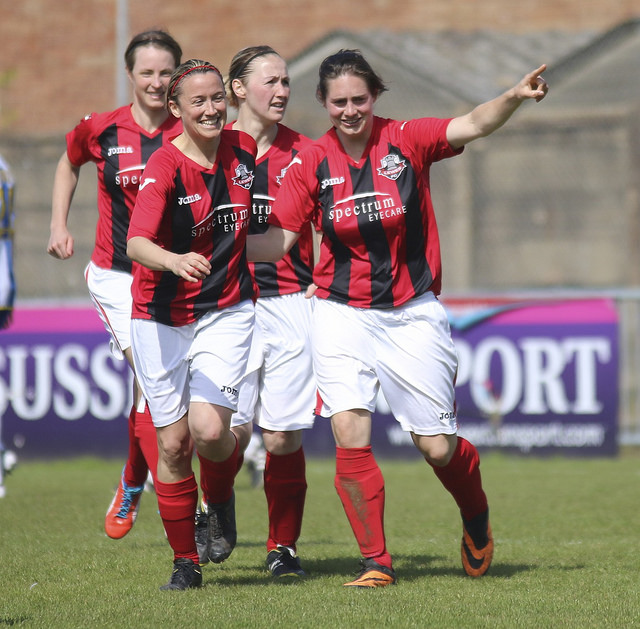
A football team celebrates together after scoring a goal! ( Lewes Ladies 2 BHA 1 4 May 2014. 645 , credit: James Boyes distributed via a href=” https://www.flickr.com/”> flickr).
Some ClimateSnack teams started scoring goals! ClimateSnack participants have published over 100 articles online, some of which articles have appeared in newspapers here in Norway. Many participants feel that their writing has improved. Some participants have even started receiving better peer reviews for their scientific publications. Other participants have also used their new network to organize science communication workshops. Even if many writing groups didn’t find a footing, for some people the concept worked really well. And many people have made good friends!
Just like with many football teams, they are more likely to score more goals if they have generous sponsors. Football clubs need to buy kits, pay for pitch maintenance and travel to play other teams. A writing group project like ClimateSnack ideally needs some funding to let new ideas flourish and allow different groups to interact and learn from each other. The ClimateSnack founders had big ambitions to create an international online community where ECS would interact and peer-review each other’s articles across borders. We secured some funding to update the website, but never to implement the kind of things needed to properly promote an international community.
Despite the challanges we encountered, we have seen that writing groups can be a really effective way to learn writing skills together (like ours in Bergen in the photo). Maybe they are so effective that universities should consider implementing them in curricula for all students at all levels. With this in mind, I’ll indulge with a final football-related analogy. When I was a child, we had to play football at school. I didn’t like it! However, now I appreciate that I got fit and healthier, and I learned skills that I could apply to other sports in the process. You see the link to learning basic writing skills?
Indeed, if you think about it, I could have applied the football team analogy to any aspect of research education: We can learn anything alone, but it can be more enjoyable and rewarding if we learn together. However, I think the analogy works well with communication. After all, this is the part of the research process where we really have to put ourselves out there, we have to receive feedback, debate our results, and defend our conclusions, often in open forums. These are all elements at the forefront of writing group dynamics.
Read more about the highs and lows of our ClimateSnack project in our paper in the recent HESS/NHESS special issue on Effective Science Communication and Education in Hydrology and Natural Hazards.
By Mathew Stiller-Reeve, co-founder of ClimateSnack and researcher at Bjerknes Centre for Climate Research, Bergen, Norway
Reference
Stiller-Reeve, M. A., Heuzé, C., Ball, W. T., White, R. H., Messori, G., van der Wiel, K., Medhaug, I., Eckes, A. H., O’Callaghan, A., Newland, M. J., Williams, S. R., Kasoar, M., Wittmeier, H. E., and Kumer, V.: Improving together: better science writing through peer learning, Hydrol. Earth Syst. Sci., 20, 2965-2973, doi:10.5194/hess-20-2965-2016, 2016.

